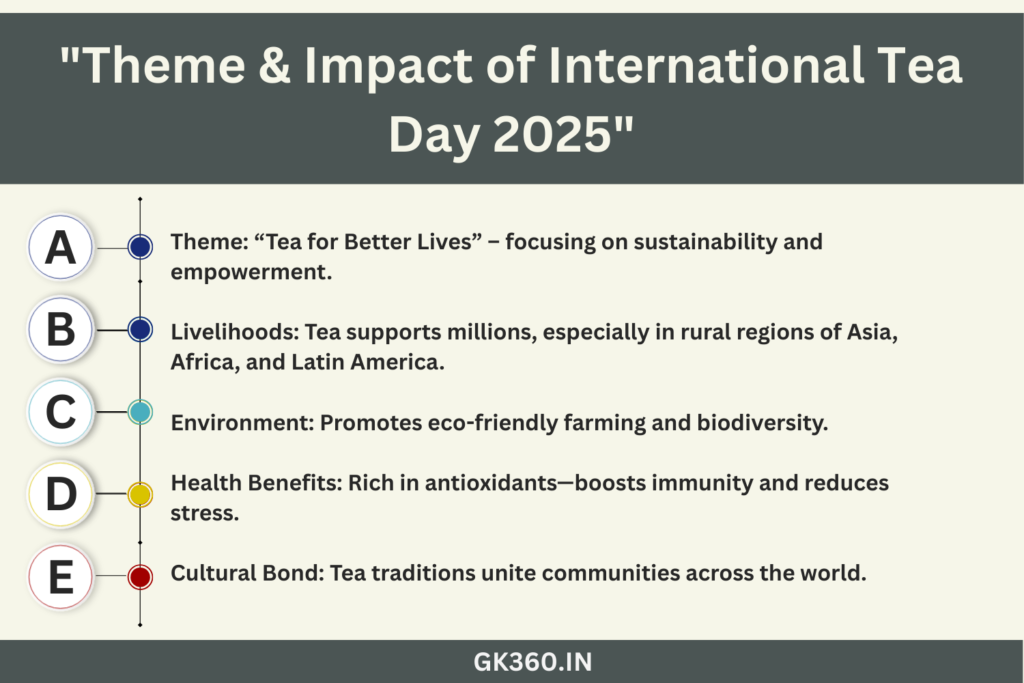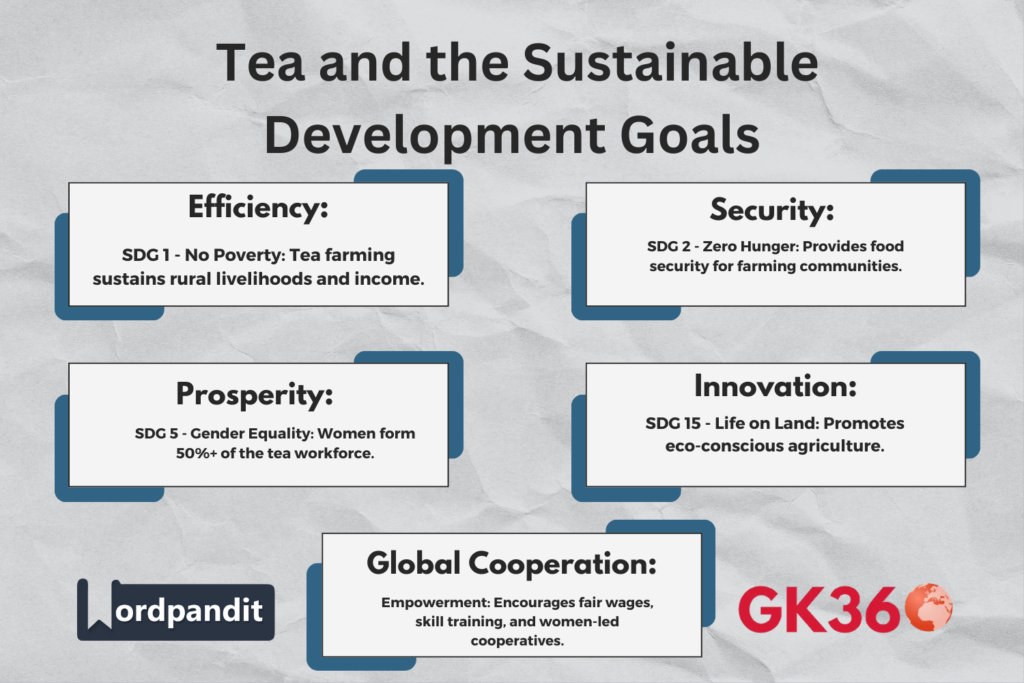International Tea Day 2025: Theme, History, Significance, and Global Impact
Introduction
Every year on May 21, the world comes together to celebrate International Tea Day—a global tribute to one of humanity’s oldest, most beloved beverages. As the second most consumed drink after water, tea is more than a simple infusion; it is a symbol of culture, community, livelihood, and well-being. In 2025, this observance carries the theme “Tea for Better Lives,” highlighting the beverage’s crucial role in promoting sustainable agriculture, fair trade, and health.
From lush plantations in Assam and Darjeeling to tea ceremonies in Japan and roadside chai stalls in India, tea weaves together diverse narratives of heritage, empowerment, and resilience. Let’s explore the deep-rooted legacy, modern relevance, and global significance of tea through this comprehensive guide to International Tea Day 2025.

Table of Contents
- Introduction
- History of Tea: From China to the World
- UN Recognition of International Tea Day
- 2025 Theme: Tea for Better Lives
- Tea and the Sustainable Development Goals (SDGs)
- Why International Tea Day Matters
- Global Tea Culture and Traditions
- Women in the Tea Sector: Empowerment Through Equity
- Inspiring Quotes for Tea Lovers
- FAQs About International Tea Day
- Conclusion: Raising a Cup to Global Unity
History of Tea: From China to the World
The origin of tea dates back over 5,000 years to ancient China, where legend credits Emperor Shen Nung with its accidental discovery in 2737 BC. As tea leaves drifted into his boiling water, the resulting brew captivated the emperor with its aroma and taste.
Initially revered as a medicinal elixir used in spiritual rituals, tea began its long journey across borders, evolving into a staple drink in Asia, Europe, and eventually, the world. By the 19th century, tea had become an economic commodity at the heart of colonial trade strategies.
The Indian Tea Revolution
In 1824, the British introduced tea cultivation to India, leveraging the fertile soils and temperate climates of regions like:
- Assam
- Darjeeling
- Nilgiris
Today, India stands as one of the largest producers and consumers of tea, contributing close to 900,000 tonnes annually.
UN Recognition of International Tea Day
In December 2019, the United Nations General Assembly officially designated May 21 as International Tea Day, based on a proposal by the Intergovernmental Group on Tea.
This move was aimed at:
- Acknowledging tea’s contribution to rural development and poverty alleviation
- Supporting sustainable agricultural practices
- Promoting inclusive growth, particularly for smallholder farmers and women in the tea supply chain
By institutionalizing the observance, the UN provided a platform for recognizing tea’s role in achieving global equity and ecological responsibility.
2025 Theme: Tea for Better Lives
The official theme for International Tea Day 2025 is “Tea for Better Lives.” This phrase captures tea’s role as a vehicle for empowerment, health, and sustainability.
Whether consumed for comfort, culture, or wellness, tea:
- Improves livelihoods in developing countries
- Supports biodiversity through eco-friendly farming
- Promotes well-being as a low-calorie, antioxidant-rich beverage
Tea and the Sustainable Development Goals (SDGs)
Tea production and consumption are directly aligned with several of the UN’s Sustainable Development Goals:
SDG 1: No Poverty
- Tea sustains millions of livelihoods, particularly in rural economies.
- It provides year-round employment and income stability for many vulnerable populations.
SDG 2: Zero Hunger
- Income from tea farming enhances food security and nutritional access for farming communities.
SDG 5: Gender Equality
- Women dominate the tea workforce, often in roles like plucking, sorting, and managing cooperatives.
- Empowering them through education, ownership, and market access is key to long-term industry growth.
SDG 15: Life on Land
- Adopting sustainable agricultural techniques (e.g., intercropping, organic practices) helps preserve ecosystems and fight deforestation.
Through responsible cultivation and trade, tea can be a catalyst for social transformation and environmental stewardship.
Why International Tea Day Matters
Beyond its soothing taste, tea supports the livelihoods of millions of farmers and workers—especially in developing countries across Asia, Africa, and Latin America. This global observance calls attention to the critical socio-economic and environmental issues faced by the industry.
Key Objectives of International Tea Day:
- Promote fair wages and safe working conditions for tea workers.
- Encourage sustainable agricultural practices to protect land and water resources.
- Empower women through leadership roles, skill training, and equal pay.
- Boost local consumption in tea-producing nations for economic resilience.
Tea is also renowned for its health benefits, particularly in green and herbal forms. Rich in antioxidants like catechins and polyphenols, it supports:
- Cardiovascular health
- Mental alertness
- Immune system function
- Stress reduction
International Tea Day reminds us that each cup carries a story of labor, culture, and care—and calls for us to drink more responsibly.
Global Tea Culture and Traditions
Tea is more than a beverage—it’s a global cultural ritual. Across continents, people connect over a shared love of tea, each with their own customs and symbolism:
- India: Roadside chai stalls act as daily gathering spots and symbols of social bonding.
- China: Tea ceremonies emphasize respect, harmony, and balance.
- Japan: The Chanoyu ritual is rooted in Zen principles and precision.
- Morocco: Green tea with mint represents hospitality and generosity.
- United Kingdom: “Afternoon Tea” is a celebrated cultural tradition.
These cultural practices showcase tea’s unifying power, bringing people together across geographies and generations.
Women in the Tea Sector: Empowerment Through Equity
Women make up over 50% of the workforce in the global tea industry—especially in plucking and processing stages. However, their contributions are often undervalued and underrepresented in leadership.
Challenges Women Face:
- Gender-based wage gaps
- Limited access to land, credit, and training
- Underrepresentation in cooperatives and unions
Pathways to Empowerment:
- Invest in women-led enterprises and cooperatives.
- Create gender-sensitive policies in the tea sector.
- Provide leadership training and equal access to market information.
Empowering women strengthens family welfare, community resilience, and industry profitability.
Inspiring Quotes for Tea Lovers
Celebrate the warmth and wisdom of tea with these thoughtful quotes:
- “Where there’s tea, there’s hope.”
- “A cup of tea is an excuse to pause, refresh, and reconnect.”
- “Tea is more than a drink; it’s a culture brewed with care.”
- “From Darjeeling to Assam, every sip celebrates heritage and hard work.”
- “On International Tea Day, let’s toast to tradition, sustainability, and health.”

FAQs About International Tea Day
- Why is May 21 celebrated as International Tea Day?
May 21 was designated by the UN to recognize tea’s cultural, economic, and environmental importance and to promote sustainable practices in the tea sector. - What is the theme of International Tea Day 2025?
The 2025 theme is “Tea for Better Lives,” emphasizing tea’s role in sustainable development, health, and economic empowerment. - How does tea contribute to the Sustainable Development Goals (SDGs)?
Tea contributes to SDGs like No Poverty, Gender Equality, Zero Hunger, and Life on Land by supporting livelihoods, empowering women, and promoting biodiversity. - What are the health benefits of drinking tea?
Tea is rich in antioxidants, boosts heart health, improves focus, and aids digestion. Green and herbal teas are especially valued in wellness routines. - How can consumers support ethical tea production?
Look for fair-trade, organic, and sustainably sourced labels. Support brands that invest in worker rights and environmentally friendly farming.
Conclusion: Raising a Cup to Global Unity
On May 21, let us raise our cups not just to enjoy the soothing essence of tea—but to honour the millions of hands behind every leaf, the cultural stories woven into every tradition, and the sustainable future tea can help build.
Tea connects the world—across borders, communities, and conversations. By promoting fairness, inclusion, and environmental stewardship, International Tea Day 2025 becomes more than a celebration; it becomes a call to action.
Key Takeaways Table
| Aspect | Details |
| Theme for 2025 | “Tea for Better Lives” – highlighting health, equity, and sustainability. |
| UN Recognition | Declared by the UN in 2019 to promote tea’s socio-economic and ecological roles. |
| Economic Importance | Tea supports livelihoods in rural regions and generates global trade value. |
| SDG Alignment | Strongly linked with SDGs 1, 2, 5, and 15 through its sustainable practices. |
| Women’s Role in Tea Sector | Women dominate labor roles but need more access to leadership and resources. |
| Cultural Significance | Deep-rooted traditions in India, China, Japan, Morocco, UK, and beyond. |
| Health Benefits | Rich in antioxidants; supports immunity, focus, and cardiovascular health. |





